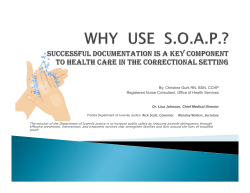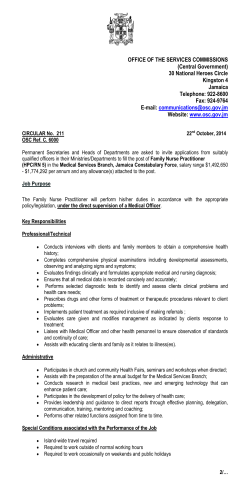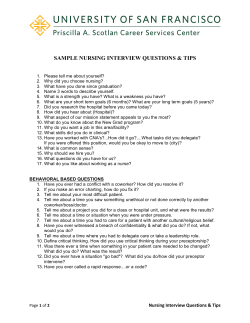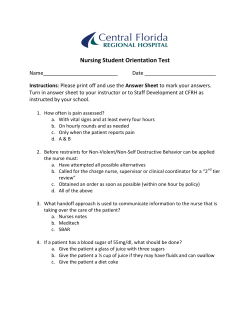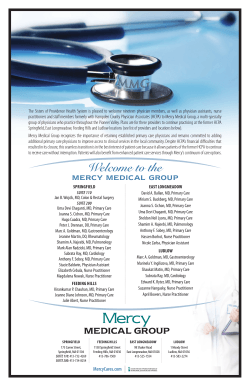
California Association of Physician Groups
April 6, 2015 Via Fax: (916) 266-9343 The Honorable Jerry Hill Senate Business, Professions & Economic Development Committee State Capitol, Rm. 2053 Sacramento, CA 95814 Re: Support - SB 323 (Hernandez) Nurse Practitioners Dear Chairman Hill: CAPG represents over 160 accountable physician groups in California and across the United States that serve 20 million patients. We support policy measures that encourage the implementation of the Triple Aim – decreased cost, improved patient experience and development of population health management. We are pleased to support this bill, and we greatly appreciate the efforts of the author, staff, sponsors and stakeholders. SB 323 follows the 2013 effort under SB 491, which was also supported by CAPG. SB 323 would increase patient access to care by updating outmoded supervision rules for certain Nurse Practitioners that qualify under the provisions of the bill. It would accomplish this by relieving certain NPs from direct physician supervision requirements by giving them “full practice authority” to provide care within the limits of their training and experience. This bill does not expand the scope of practice that a Nurse Practitioner can perform under California Law, i.e. the specific kinds of procedures that they can do. Nurse Practitioners have differing scopes of practice – based upon their education, level of certification, and specialty training. Many practice in primary care settings. Others practice in the specialties quite effectively. If you have been to the Emergency Department recently, you may have been seen by a Nurse Practitioner instead of a Physician or Osteopath, and you probably received excellent care. If someone tells you that this bill will permit a Nurse Practitioner to perform brain surgery, he or she is incorrect. This bill does not expand the legal scope of practice; it changes the supervision requirement for the level of qualified practice that a particular Nurse Practitioner has reached. What is “full practice authority?” Under current law, Nurse Practitioners must practice under the supervision of a physician or osteopath. Does this mean that a physician is standing by and observing while a Nurse Practitioner is assessing or treating a patient? No. But it does mean, in practice, that a Nurse Practitioner must find a physician or osteopath willing to enter into a “collaborative practice agreement” before they can practice anywhere. This limits where and how they can practice, and in which programs. If a Nurse Practitioner cannot find a supervising physician in Yreka willing to take Medi-Cal so that she can handle Medi-Cal patients, the community goes unserved. This actually happened on the eve of the coverage expansion in California. Nineteen other states have already permitted the same modification, so this proposal is neither novel nor unproven. Why is it needed now? Since SB 491 stalled in Assembly Appropriations Committee in the 2013 Session, California has added 5 million newly insured patients to the healthcare system. Recently, newly insured patients tried to find doctors once they had obtained coverage but found that many practitioners had closed their practices to new patients. Care delayed is care denied, as they say. California has an aging primary care physician and osteopathic workforce. Other states have proven that Nurse Practitioners with full practice authority function well in that role, and there is a wealth of national studies that have analyzed the environments in which full practice authority has been legislated and all have concluded that it is a safe and effective means to increase access to quality care. While there is a wealth of studies that support this concept, there is little or no evidence to refute it. 2 Does this apply to all Nurse Practitioners? No, only to those who meet the increased criteria, which include the following: • Must be certified by a national certifying body – especially with regard to specialty practice. • Maintains professional liability insurance • Must practice within the following settings: o A clinic, health facility, or county medical facility o An accountable care organization (defined by the ACA) o A group medical practice, including a medical corporation, another form of organization controlled by physicians and surgeons, a medical partnership, a medical foundation exempt from licensure, or another lawfully organized group of physicians that delivers, furnishes, or otherwise arranges for or provides health care services, a medical group, or an independent practice association. CAPG insisted on the third criteria listed above for a variety of reasons, and Nurse Practitioners agreed to it during the SB 491 process in 2013, and again with respect to the present bill, SB 323. These practice settings cited in the bill are the places where coordinated patient care is occurring throughout California. These are the practice settings that submit to tracking and public reporting of performance measures and patient outcome data that proves safety and quality. These are the places where the concept of “team based care” is being developed and evolved. In short, the kinds of places that are advancing increased access to care, quality of care, and the transparency of outcomes, as well as striving to provide more affordability. CAPG wanted to ensure that if full practice authority was legislated for Nurse Practitioners that it wouldn’t result in the creation of another silo of care in a fragmented delivery system. By requiring that NPs practice in these settings, we are assured that collaboration between all health professionals will occur. We believe that this provision within the bill will function to increase the safety of care provided by Nurse Practitioners – and this provision goes over and above that of any other state that has legislated full practice authority for NPs. 3 In conclusion, CAPG member physician groups (which are owned and operated by physicians) contract with payers (HMOs and PPOs, Medicare and Medi-Cal) to provide access to health care services. Our members are engaged in the service of providing access to health care. This bill increases the ability to provide access in meaningful ways to cope with the expansion of the patient base in California. It modernizes licensure law to reflect the current reality. It allows Nurse Practitioners to practice to the full extent of their education and training. Full practice authority has been proven safe and effective in ninetine other states. Respectfully, we urge your “aye” vote. Sincerely, William Barcellona, Esq. MHA Sr. V.P. Government Affairs Cc: Senate B,P& ED Committee members 4
© Copyright 2026

